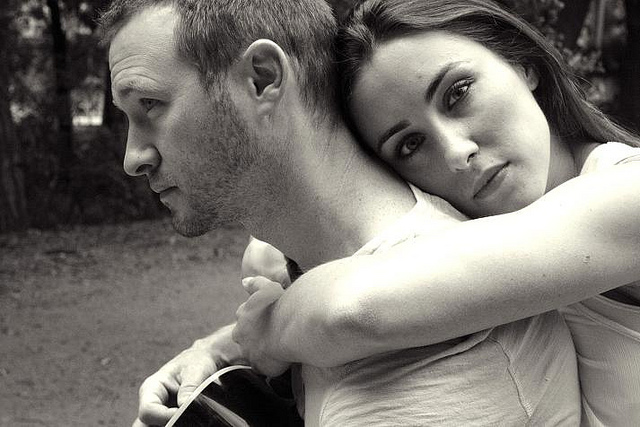Codependency is when couples (or one person in the couple) stop functioning independently inside a relationship.
They become so dependent that they forget themselves.
I’ve been there once, and I know how challenging those relationships can get. The dependent person suffers, but so does the one who’s being depended on.
I’ve realized that love can turn into fear at any given moment inside a relationship. Instead of loving our partner, we might suddenly become afraid of losing them. When fear presides over a relationship, the relationship becomes destructive and drains both partners. We feel as if we’re stuck in a vicious cycle.
Since I have experienced this, I can tell you that our identity is usually sacrificed in codependent relationships.
The solution doesn’t necessarily have to be a breakup. We can spot the warning signs and work on loving ourselves or setting better boundaries. We might realize we’re the dependent one or ascertain that our partner is.
Codependency can be solved, but it must be identified first.
Here are 11 warning signs to watch out for:
Giving up your own needs to meet theirs. It’s natural for partners to meet each other’s needs. However, it’s unhealthy when we make sacrifices without getting much in return. Then, there will be an imbalance in the relationship, and that often creates problems. We might abandon personal relationships, beliefs, or a particular routine to satisfy our partner. It’s imperative to take into account that our partner might not necessarily ask us to abandon these things, but we may do so out of fear of losing the relationship.
Your feeling of self-worth is incomplete without your partner’s approval. Our self-worth is at stake when we’re in a codependent relationship. We might never feel worthy enough without the approval of our partner. This can become dangerous, because we may start to need their consent for everything—even when it comes to the little things, like what to wear or how to look. We might not realize how much our self-worth is dependent on them until we break up, when we then find it difficult to behave independently without their approval.
Your focus shifts solely onto the relationship. In a codependent relationship, we lose focus on ourselves, career, friends, and family. Our focus shifts entirely to the relationship. With time, it might feel as if we’ve developed some sort of obsession with our partner. We later despise (or avoid) anything that distracts us from thinking about them.
Identifying unhealthy patterns in the relationship, yet staying in spite of them. Oftentimes, when we are too dependent on our partner, we brush issues under the rug. We might be involved with a cheater, a narcissist, an alcoholic, or an emotional abuser—yet, we stay with them. Furthermore, we become incapable of solving these issues properly. We might prefer to stay in an unhappy relationship than have to go through the pain of separation.
Needing them to be present in all your plans. Autonomy dissolves in a codependent relationship. We might neglect the plans in which our partner isn’t present or withdraw from the friends who don’t like our partner. The need for them to be with us everywhere intensifies when we become too dependent on them. They become an inherent part of us that we can’t let go of.
Choosing to be with them, instead of being alone. We all have hobbies of our own and fancy spending some time alone. However, being alone begins to terrify us, or we might deem it as pointless when we’ve become too dependent. Instead of doing something enjoyable alone, we convince ourselves that seeing our partner is more beneficial. We stop doing things for ourselves, because alone time doesn’t seem as important anymore. All importance shifts to the relationship.
The inability to find happiness outside of your partner. Our partner undoubtedly makes us happy. However, our partner shouldn’t be the only source of our happiness. When our happiness stems from them only, we place pressure on them without realizing. Moreover, we find it challenging to be happy when they’re not around.
You become controlling. Maybe we get mad when they don’t contact us, hang out with their friends, or when they don’t meet our needs. When we become dependent, we become controlling. We become clingy, because we unconsciously think that by needing our partner, we make them stay. It all results from the fear of separation.
You suffer from anxiety when you think of separation. When we fear losing our partner, we make double the effort to make them stay. We either conform to our partner’s wishes, or we change, or we change them. We may attempt all of these in order to keep the relationship going—we might even use guilt as a tool to stop them from leaving. When we think of separation, we feel as if it’s the end of the world and the end of us.
Feeling wrong or bad. There’s something negative that you feel deep within yourself when you’re dependent. We usually can’t identify this feeling, but we essentially stop feeling good about ourselves.
You are given feedback that you are too dependent on your partner. Friends and family can see our life’s situation objectively—unlike us. We’re often so immersed in the event itself that we fail to see it from a wider perspective. If we receive comments that we are too dependent, then we probably are.
~
Relephant:
9 Signs your Relationship might be Co-Dependent.
Codependency Feels like Prison & I am Never Committing that Crime Again.
~
Author: Elyane Youssef
Image: Flickr/Ashley Webb
Editor: Yoli Ramazzina

No comments:
Post a Comment